Publications received in 2022 at the ICOMOS Documentation Centre
ICOMOS
ICOMOS has launched a series of thematic studies on the management of water as a form of cultural heritage, based on a regional approach, in the 2010s. The first region studied resulted in a publication in 2015, dedicated to ‘The Cultural Heritages of Water in the Middle East and Maghreb’ (with an revised and expanded version published in 2017). In particular, the aim was to invite States parties to pay more attention to water attributes and significances related to large and complex nominations, as is the case with historical centres or cultural landscapes. In fact, water has a special place among the many relationships which exist between human beings and nature. It is a permanent and essential human need. Access to water is a vital common element to all human civilisations; there are no exceptions, reiterating that all civilisations have a water culture. In this volume devoted to the tropical and subtropical countries of East and Southeast Asia, the scope of the heritage considered has been limited to freshwater and inland waters. It is a world region with well identified and strong common characteristics both for its climate conditions and sharing common cultural values, such as the monsoon phenomenon, the ‘rice civilisation’, mutual influences and exchanges through history, technical practices for construction and arts, etc. This thematic study This should primarily be seen as a methodological aid for anyone wishing to consider these questions, with a view either to achieving recognition and protection of such heritages by the World Heritage List, or to protecting heritage in a national or regional context.
|
|
|
ICOMOS & ISCM CHC
This project report presents the scientific outcome of the International Co-Sponsored Meeting on Culture, Heritage and Climate Change (ICSM-CHC).
|
|
|
|
|
|
|
ICOMOS & CVI Africa This report outlines the results of applying the Climate Vulnerability Index (CVI) to Sukur Cultural Landscape, a World Heritage property in northeastern Nigeria. The CVI methodology is a technique to assess rapidly the vulnerability of cultural and natural WH by identifying realised and potential impacts of climate change to both Outstanding Universal Value (OUV) and the associated community. The application of the CVI for Sukur provided many important precedents, being the first time that the CVI was applied in an African WH property and in a cultural landscape-inscribed property. It was also the first using a ‘blended workshop’ format whereby most workshop participants were at the American University of Nigeria in Yola, whilst other participants joined the workshop online. The CVI workshop took place 19th-24th September 2021 and involved site managers, academics, community representatives, Non-Governmental Organisations (NGOs) and responsible management agencies. The workshop was preceded by preparatory webinars examining key values, climate change, and economic and social information.
|
|
This report describes the outcomes from an application of the Climate Vulnerability Index (CVI) for the Ruins of Kilwa Kisiwani and Ruins of Songo Mnara World Heritage property in Tanzania. L'atelier CVI s'est déroulé les 18 et 19 octobre 2021 selon le mode Consult, une évaluation plus ramassée et rapide qu'un atelier complet. Il s'est déroulé en présentiel et a impliqué le gestionnaire du site, un représentant du Musée national de Tanzanie, le président et les membres du comité des ruines du site et un traducteur. Des animateurs et d'autres membres de l'équipe du projet ont participé à distance. Il a été précédé de trois webinaires préparatoires avec des contributions d'experts d'horizons très divers qui ont alimenté directement la consultation.
|
UNESCO, ICCROM, ICOMOS & UICN
As the World Heritage Convention celebrates its 50th anniversary in 2022, over 1100 sites around the world are recognized as World Heritage - places that are so valuable to humanity that there conservation has been deemed our collective responsibility. Yet many of these exceptional places face increasing pressure from diverse types of development projects within and around the sites. Assessing the impacts of such projects – before deciding to proceed with their implementation – is essential to both prevent damage to World Heritage and identify sustainable options. The Guidance and Toolkit for Impact Assessments in a World Heritage Context is the go-to reference that explains the process for achieving these goals. Offering practical tips and tools including checklists and a glossary, it provides a framework for conducting impact assessments for cultural and natural heritage sites. Developed by UNESCO and the Advisory Bodies to the World Heritage Committee, ICCROM, ICOMOS and IUCN, this manual fosters cross-sectoral, multidisciplinary collaboration to identify solutions for both protecting World Heritage sites and supporting good quality and appropriate development. States Parties to the World Heritage Convention, heritage managers, decision-makers, planners and developers are invited to use it to help realise our collective commitment to passing on our precious heritage to future generations.
|
ICOMOS ICUCH
Since its inception in 1991, the International Committee on the Underwater Cultural Heritage (ICUCH) has advocated for the better legal protection, preservation and professional standards relating to underwater cultural heritage. In Heritage Under Water at Risk: Threats, Challenges and Solutions, ICUCH’s second contribution to ICOMOS’ Heritage at Risk series, there are 30 articles representing 23 countries spanning Asia and the Pacific, Arab States, Europe and North America, and Latin America and the Caribbean. With such geographical diversity there is inevitably a wide range of themes and scope of underwater cultural heritage found in, rivers, lakes, cenotes, as well as coastal and offshore marine environments. The volume is divided into five sections: legal and policy frameworks; challenges and solutions; preservation in situ; public engagement, and capacity building, noting that some papers span more than one theme. The focus is aimed at presenting examples of where heritage is at risk, but where applicable, also presenting sustainable solutions. The diversity of themes represented in the book underlines ICUCH’s knowledge and experience which provides it with a strong platform to remain an important and influential force in all matters relating to cultural heritage located in inland waters, coastal and underwater environs. By so doing ICUCH will continue to demonstrate the importance and relevance of the ICOMOS Charter on the Protection and Management of Underwater Cultural Heritage (Sofia 1996) that underpins the fundamentals of the committee’s formation and purpose.
|
ICOMOS PRERICO
This book introduces important reflections on understanding the meaning of cultural-religious heritage in an international context and their relationship with issues of sustainability at the local community level. Through a holistic approach, the book charts new courses in analyzing different cultural policies and methods for preserving and enhancing cultural heritage. Stemming from an intercultural seminar promoted by the International Scientific Committee Places of Religion and Ritual (ICOMOS PRERICO) under the theme of “Reuse and regenerations of cultural-religious heritage in the world: Comparison among cultures,” the book examines the scientific diplomacy and cultural strategies promoted by countries in dialogue with the UN 2030 Agenda, as well as Agenda 21 for Culture. The book seeks to reinforce the value of local cultural policies for supporting and enhancing cultural-religious heritage through specific programs and collaborations in dialogue with government policies. This collection is relevant to scholars working in areas relating to cultural heritage, religious heritage, architectural restoration, protection of the local inheritances, law, and management of the cultural sites.
|
|
In the context of the ICOMOS annual meetings, the ICOMOS Advisory Committee organises its 2022 Scientific Symposium on 29 and 30 October at the Fine Arts Department (Bangkok, Thailand) on the theme “Religious Heritage: Celebrating and conserving places of religious and ritual significance in a global world and in changing climates”. Religious heritage is a living heritage which greatly impacts the way people go about their daily life. The Covid-19 pandemic in particular has brought changes to patterns of worship and the use of religious heritage places, for instance due to limits in attendance numbers at ritual ceremonies, requirements for social distancing, development of on-line worship. Nevertheless, its religious and ritual significance has not diminished for communities. Climate change and its effects – such as changing temperatures and seasonal climate patterns, floods, droughts, extreme precipitation events, unseasonal rain, snow and wind, melting glaciers – are having an impact on the conservation, protection and management of religious heritage – places of religion and ritual. Existing conservation and management plans, especially long term planning, needs to be revised. The recognition and response to these issues vary widely based on the traditions and customs of religious and/or ethnic groups. The 2022 Scientific Symposium attempts to explore these impacts and challenges through the following sub-themes: 1. Significance of places of religion and ritual. 2. Influence of climate change on the conservation, protection and management of religious heritage. 3. Changing use and perception of places of religion and ritual following the Covid-19 pandemic. 4. Practice of pilgrimage following the Covid-19 pandemic. 5. Reuse of religious heritage places.
|
ICOMOS Dominican Republic
El color en la arquitectura vernácula - República Dominicana. Virginia Flores Sasso, Virginia, Esteban Prieto Vicioso, Letzai Ruiz Valero et al. Santo Domingo : Organización del Gran Caribe para los Monumentos y Sitios. 74 p. ISBN 978-9945-9028-2-2 (print). [Spanish] Colour in Dominican vernacular architecture, albeit always present and attracting attention, has been little studied and valued. Its origins are often attributed to African influence without any documentary basis. Furthermore, colour is compared with other regions of the Caribbean, forgetting that colour actually reflects people and their history, as their natural expression passed down from generation to generation. Vernacular architecture is conditioned by the environment and natural resources found in immediate surroundings with some changes and adjustments over time. It acts as a territorial reference and becomes part of the rural landscape. It is an exponent of the historical social structure of the village reflected in a shared code, which, although not explicit in words or deeds, is understood and reveals differences through various features and ornamental elements in a subtle hierarchy. Among these distinctive features of vernacular architecture is the colour applied to the exterior, the interior, the furniture and ornamental and constructive details. For this reason, and after many years of observation and study of the Dominican vernacular architecture and the behaviour of its inhabitants and builders, we decided to share our experience on colour. For this purpose, this book has been divided into four sections: the first deals with Dominican vernacular architecture, its origins and evolution; the second deals with the presence of colour in Dominican vernacular architecture and the types of paints used over time; the third deals with colour in vernacular furniture and ornaments, its importance and meaning; and finally are listed the colour patterns used in Dominican vernacular architecture.
|
ICOMOS Finland
Summer villas became a special phenomenon on the Karelian Isthmus during the 1870s, when the railway created a new connection between the Finnish Grand Duchy and St. Petersburg, the capital of Imperial Russia. The coastal stretch of the Isthmus northwest of St. Petersburg developed into a meeting point between two cultures, as thousands of summer vacationers found the area. Still in the present day, this “Northern Riviera” holds an aura of a glorious “Paradise Lost” of endless summer days and long beaches, populated with beautiful villas and picturesque villages. The area of Terijoki, today Zelenogorsk, became the most famous summer resort. This publication, a joint venture of Finnish and Russian authors, explores the rich history of wooden coastal villas. Architecturally these buildings allowed great freedom in design, and came to symbolise summer time leisure. A range of essays introduce perspectives on history, the stylistic exchanges and variations, as well as documenting and restoration of the villas. In addition to history, the work at hand offers insights to the contemporary questions concerning the future of this shared heritage.
|
ICOMOS Panama
The First International Seminar on Intervention and Legislation in Historic Centers (ILCH) was held virtually within the framework of the International Summer School 2021 of the University of Panama, from February 22 to 26 of the same year. The case studies of countries such as Spain, Chile, Peru, Argentina, Colombia and Panama provided a sufficiently broad comparative framework for the discussion on the current legislation and intervention in historic centers at the international level. It also opened the compass on the need for a revision of the current legislation, both for the historic monumental complex of the Casco Antiguo or historic district of the city of Panama and for the historic center of Colón.
|
ICOMOS Sustainable Development Goals Working Group
This paper will investigate the integration of climate action and the application of the Sustainable Development Goals (SDGs), in site management of World Heritage properties. Two sites are investigated: the Taj Mahal in India and Monticello and the University of Virginia in Charlottesville in the USA. This is a continuation of research done in 2021 by the ICOMOS Sustainable Development Goals Working Group as it investigates varied strategies and global issues being put into the context of World Heritage sites, beyond its main remit of safeguarding the Outstanding Universal Value. With the advent of the climate crisis, there is an urgent need to see heritage as a solution and an integral part of climate action plans. This study is a contribution to a growing literature to aid in anticipating the devastating consequences of heritage succumbing to the potential damage of climate change.
|
Works written by ICOMOS members
The Sustainable Development Goals (SDGs) adopted by the UN in 2015 have influenced the actions of international and intergovernmental organisations and governments around the world, and have dictated priorities for international aid spending. Culture, including heritage, is often presented as fundamental to addressing the SDGs: since 2010, the United Nations has adopted no fewer than five major policy recommendations that assert its importance as a driver and enabler of development. Yet, heritage is marginalized from the Sustainable Development Goals. Rethinking Heritage for Sustainable Development constitutes a substantial and original assessment of whether and how heritage has contributed to three key dimensions of sustainable development (namely poverty reduction, gender equality and environmental sustainability) within the context of its marginalisation from the Sustainable Development Goals and from previous international development agendas. Sophia Labadi adopts a novel, inclusive, large-scale and systematic approach, providing the first comprehensive history of the international approaches on culture (including heritage) for development, from 1970 to the present day. This book is also the first to assess the negative and positive impacts of all the international projects implemented in sub-Saharan Africa by a consortium of UN organisations that aimed to provide evidence for the contribution of heritage for development in time for the negotiation of the SDGs. The book’s conclusions provide recommendations for rethinking heritage for development, while reflecting on the major shortcomings of the selected projects. |

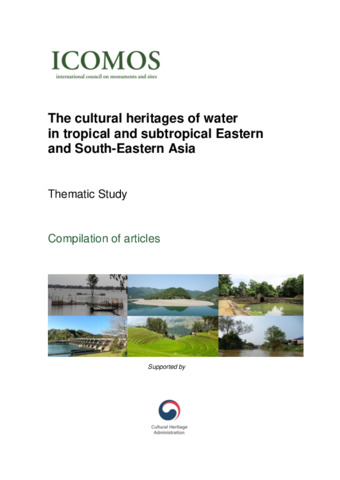 The cultural heritages of water in tropical and subtropical Eastern and South-Eastern Asia. Thematic study. Compilation of articles.
The cultural heritages of water in tropical and subtropical Eastern and South-Eastern Asia. Thematic study. Compilation of articles. 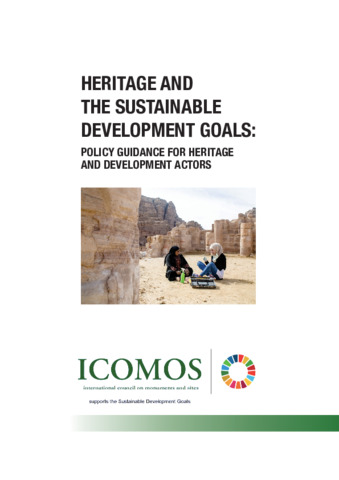 Heritage and the sustainable development goals: policy guidance for heritage and development actors. Sophia Labadi, Francesca Giliberto, Ilaria Rosetti, Linda Shetabi, Ege Yildirim. ICOMOS, 2021 [English] & 2022 [French]. 134 p. illus. (PDF)
Heritage and the sustainable development goals: policy guidance for heritage and development actors. Sophia Labadi, Francesca Giliberto, Ilaria Rosetti, Linda Shetabi, Ege Yildirim. ICOMOS, 2021 [English] & 2022 [French]. 134 p. illus. (PDF)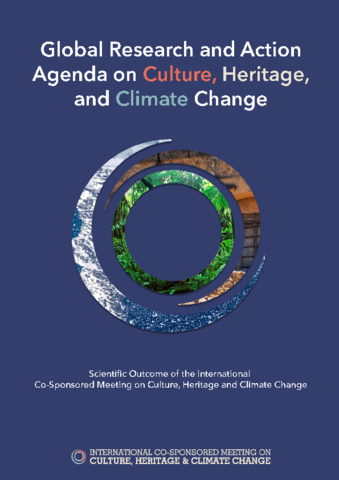 Global research and action agenda on culture, heritage and climate change. Hana Morel, William Megarry, Andrew Potts et al. ICOMOS & ISCM CHC, 2022. 75 p. ISBN 978-2-918086-69-7 (PDF) [English] - 978-2-918086-70-3 (print) [English] - 978-2-918086-79-6 (PDF) [French]
Global research and action agenda on culture, heritage and climate change. Hana Morel, William Megarry, Andrew Potts et al. ICOMOS & ISCM CHC, 2022. 75 p. ISBN 978-2-918086-69-7 (PDF) [English] - 978-2-918086-70-3 (print) [English] - 978-2-918086-79-6 (PDF) [French]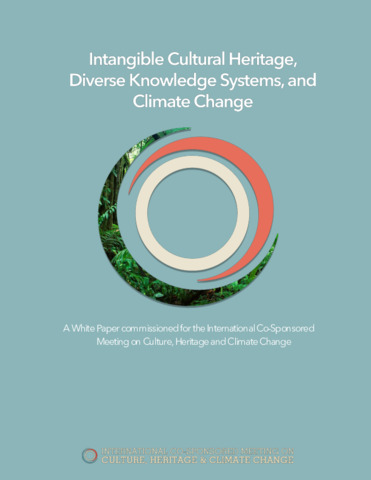 ICSM CHC White Paper I: Intangible cultural heritage, diverse knowledge systems and climate change. Contribution of Knowledge Systems Group I to the International Co-Sponsored Meeting on Culture, Heritage and Climate Change. Ben Orlove, Neil Dawson, Pasang Sherpa et al. ICOMOS & ISCM CHC, 2022. 103 p. ISBN 978-2-918086-71-0 (PDF) [English]
ICSM CHC White Paper I: Intangible cultural heritage, diverse knowledge systems and climate change. Contribution of Knowledge Systems Group I to the International Co-Sponsored Meeting on Culture, Heritage and Climate Change. Ben Orlove, Neil Dawson, Pasang Sherpa et al. ICOMOS & ISCM CHC, 2022. 103 p. ISBN 978-2-918086-71-0 (PDF) [English]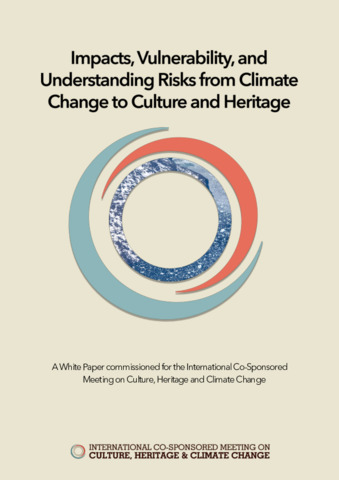 ICSM CHC White Paper II: Impacts, vulnerability, and understanding risks of climate change for culture and heritage: Contribution of Impacts Group II to the International Co-Sponsored Meeting on Culture, Heritage and Climate Change. Nicholas P. Simpson, Scott Allan Orr, Salma Sabour et al. ICOMOS & ISCM CHC, 2022.109 p. ISBN 978-2-918086-72-7 (PDF) [English]
ICSM CHC White Paper II: Impacts, vulnerability, and understanding risks of climate change for culture and heritage: Contribution of Impacts Group II to the International Co-Sponsored Meeting on Culture, Heritage and Climate Change. Nicholas P. Simpson, Scott Allan Orr, Salma Sabour et al. ICOMOS & ISCM CHC, 2022.109 p. ISBN 978-2-918086-72-7 (PDF) [English]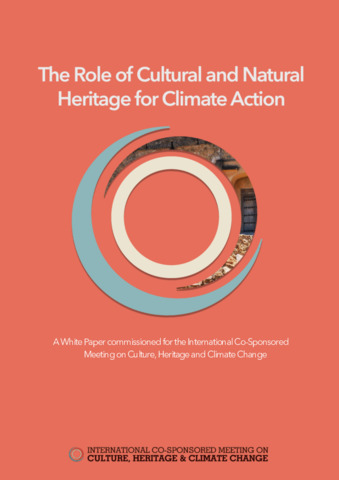 ICSM CHC White Paper III: The role of cultural and natural heritage for climate action: Contribution of Impacts Group III to the International Co-Sponsored Meeting on Culture, Heritage and Climate Change. Nick Shepherd, Joshua Benjamin Cohen, William Carmen et al. ICOMOS & ISCM CHC, 2022. 91 p. ISBN 978-2-918086-73-4 (PDF) [English]
ICSM CHC White Paper III: The role of cultural and natural heritage for climate action: Contribution of Impacts Group III to the International Co-Sponsored Meeting on Culture, Heritage and Climate Change. Nick Shepherd, Joshua Benjamin Cohen, William Carmen et al. ICOMOS & ISCM CHC, 2022. 91 p. ISBN 978-2-918086-73-4 (PDF) [English]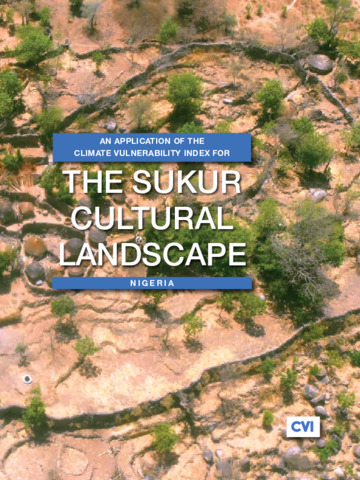 An application of the Climate Vulnerability Index for the Sukur Cultural Landscape. Jon C. Day, Scott F. Heron, Ishanlosen Odiaua et al. ICOMOS Nigeria, 2022. 60 p. ISBN 978-2-918086-83-3 (PDF) [English]
An application of the Climate Vulnerability Index for the Sukur Cultural Landscape. Jon C. Day, Scott F. Heron, Ishanlosen Odiaua et al. ICOMOS Nigeria, 2022. 60 p. ISBN 978-2-918086-83-3 (PDF) [English]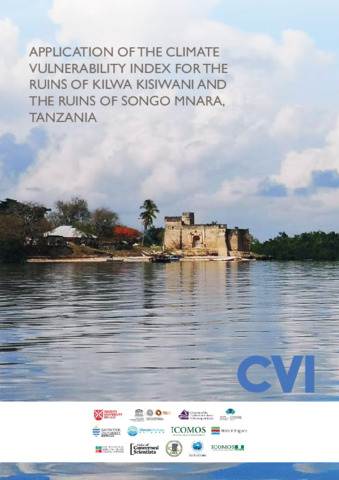 Application of the Climate Vulnerability Index for the Ruins of Kilwa Kisiwani and the Ruins of Songo Mnara, Tanzania. Scott F. Heron, Jon D. Day, Mercy Mbogelah et al. CVI Africa Project, 2022. 52 p. ISBN 978-2-918086-84-0 (PDF) [English] - 978-2-918086-85-7 (PDF) [Swahili]
Application of the Climate Vulnerability Index for the Ruins of Kilwa Kisiwani and the Ruins of Songo Mnara, Tanzania. Scott F. Heron, Jon D. Day, Mercy Mbogelah et al. CVI Africa Project, 2022. 52 p. ISBN 978-2-918086-84-0 (PDF) [English] - 978-2-918086-85-7 (PDF) [Swahili]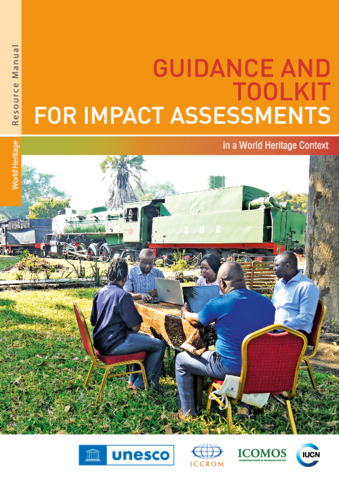 Guidance and toolkit for impact assessments in a World Heritage context. Sarah Court, Eugene Jo, Richard Mackay et al. UNESCO, ICCROM, ICOMOS et UICN, 2022. 87 p. ISBN 978-92-3-100535-0 (PDF) [English]
Guidance and toolkit for impact assessments in a World Heritage context. Sarah Court, Eugene Jo, Richard Mackay et al. UNESCO, ICCROM, ICOMOS et UICN, 2022. 87 p. ISBN 978-92-3-100535-0 (PDF) [English]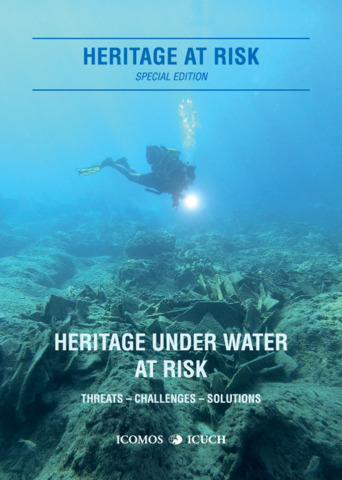 Heritage Under Water at Risk: Threats, Challenges and Solutions. Albert Hafner (ed.), Hakan Öniz (ed.), Lucy Semaan (ed.), Christopher Underwood (ed.). ICOMOS, 2022. 215 p. (Heritage at Risk, special edition.) ISBN 978-2-918086-37-6 (print), 978-2-918086-38-3 (PDF). [English]
Heritage Under Water at Risk: Threats, Challenges and Solutions. Albert Hafner (ed.), Hakan Öniz (ed.), Lucy Semaan (ed.), Christopher Underwood (ed.). ICOMOS, 2022. 215 p. (Heritage at Risk, special edition.) ISBN 978-2-918086-37-6 (print), 978-2-918086-38-3 (PDF). [English]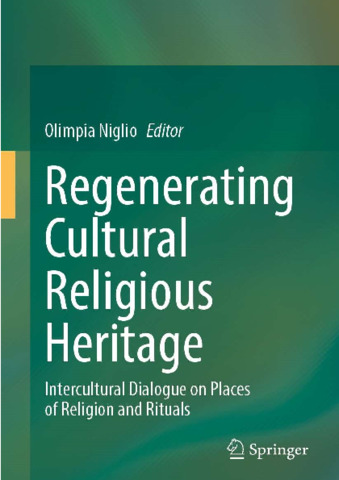 Regenerating cultural religious heritage: intercultural dialogue on places of religion and rituals. Olimpia Niglio, Andrea Longhi, Henrik Lindblad et al. Springer, 2022. 300 p. ISBN 978-981-19-3469-8 (print), 978-981-19-3470-4 (PDF) [English]
Regenerating cultural religious heritage: intercultural dialogue on places of religion and rituals. Olimpia Niglio, Andrea Longhi, Henrik Lindblad et al. Springer, 2022. 300 p. ISBN 978-981-19-3469-8 (print), 978-981-19-3470-4 (PDF) [English]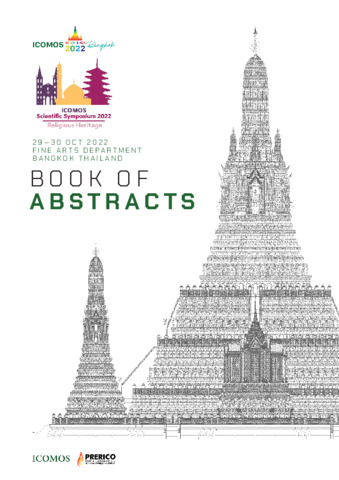 Religious heritage: Celebrating and conserving places of religious and ritual significance in a global world and changing climates. ICOMOS scientific symposium 2022 book of abstracts. 29-30 October 2022, Fine Arts department, Bangkok, Thailand. ICOMOS, 2022. 135 p. [English & French]
Religious heritage: Celebrating and conserving places of religious and ritual significance in a global world and changing climates. ICOMOS scientific symposium 2022 book of abstracts. 29-30 October 2022, Fine Arts department, Bangkok, Thailand. ICOMOS, 2022. 135 p. [English & French]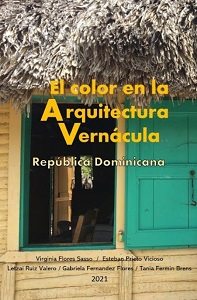
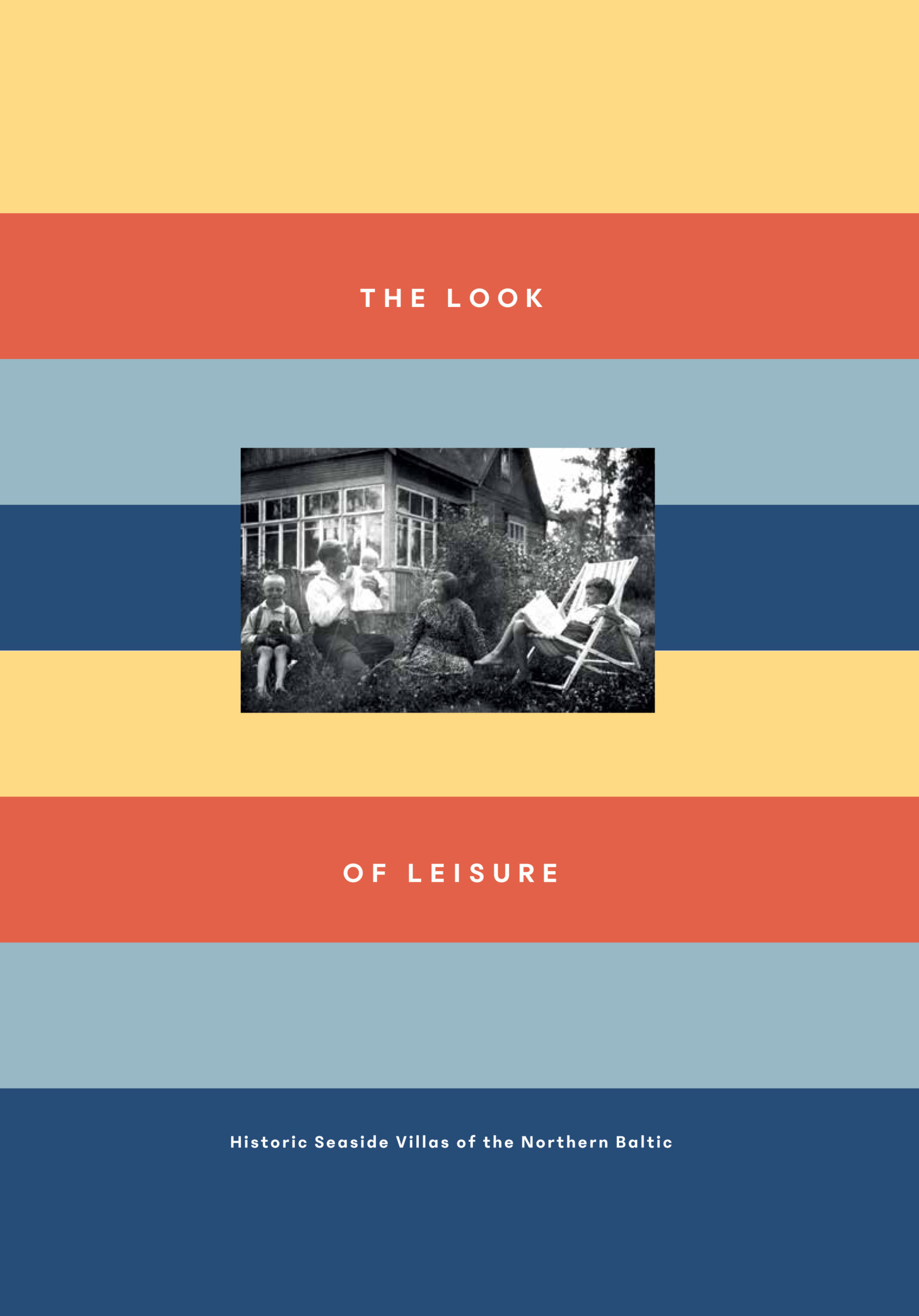 The look of leisure: Historic seaside villas of the Northern Baltic. Laura Berger (éd.). Helsinki: ICOMOS Finland & Finnish Architecture Society, 2021. 205 p. ISBN 978-952-68812-6-3 (print). [English]
The look of leisure: Historic seaside villas of the Northern Baltic. Laura Berger (éd.). Helsinki: ICOMOS Finland & Finnish Architecture Society, 2021. 205 p. ISBN 978-952-68812-6-3 (print). [English]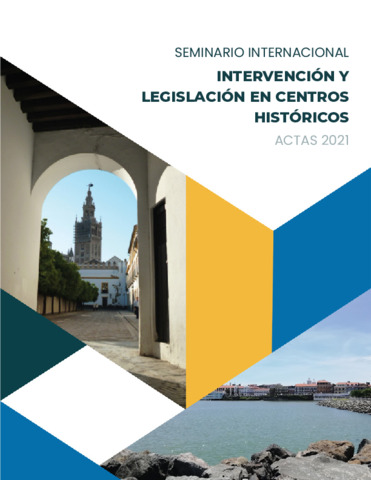 Seminario Internacional "Intervención y legislación en centros históricos". 22-26 February 2021, Panamá. Actas. Silvia Arroyo Duarte, Antonio Cubero Hernández, María Teresa Pérez Cano et al. ICOMOS Panama, 2022. 107 p. ISBN 978-0-9568370-1-1 (PDF) [Spanish]
Seminario Internacional "Intervención y legislación en centros históricos". 22-26 February 2021, Panamá. Actas. Silvia Arroyo Duarte, Antonio Cubero Hernández, María Teresa Pérez Cano et al. ICOMOS Panama, 2022. 107 p. ISBN 978-0-9568370-1-1 (PDF) [Spanish]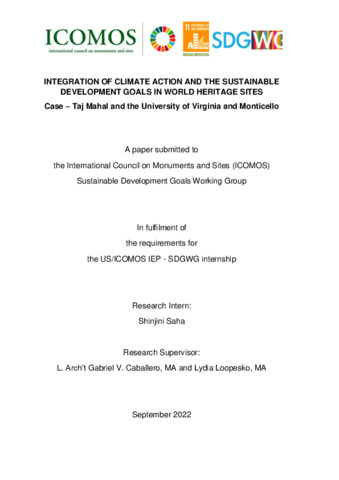 Integration of climate action and the sustainable development goals in World Heritage sites: Case – Taj Mahal and the University of Virginia and Monticello. Shinjini Saha, Caballero, Gabriel Victor, Lydia Loopesko. ICOMOS SDG WG, 2022. 83 p. (PDF) [English]
Integration of climate action and the sustainable development goals in World Heritage sites: Case – Taj Mahal and the University of Virginia and Monticello. Shinjini Saha, Caballero, Gabriel Victor, Lydia Loopesko. ICOMOS SDG WG, 2022. 83 p. (PDF) [English]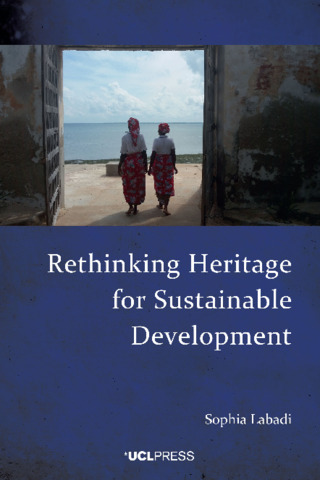 Rethinking heritage for sustainable development. Sophia Labadi. London, UK: UCL Press, 2022. 244 p. ISBN 978-1-80008-194-9 (hardback), 978-1-80008-193-2 (paperback), 978-1-80008- 192-5 (PDF), 978-1-80008-195-6 (epub). [English]
Rethinking heritage for sustainable development. Sophia Labadi. London, UK: UCL Press, 2022. 244 p. ISBN 978-1-80008-194-9 (hardback), 978-1-80008-193-2 (paperback), 978-1-80008- 192-5 (PDF), 978-1-80008-195-6 (epub). [English]